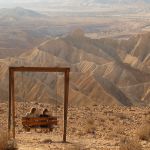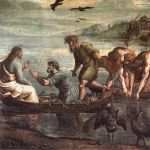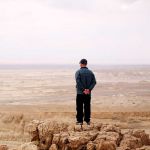Old Joppa (Jaffa) with Tel Aviv skyline to the left.
“Do not conform to the pattern of this world, but be transformed by the renewing of your mind. Then you will be able to test and approve what God’s will is — His good, pleasing and perfect will.” (Romans 12:2)
Has God ever tried to get your attention or teach you a lesson about something?
Well, He certainly did with Peter!
He and the other Jewish Apostles in Jerusalem had an issue sharing the Good News of Yeshua with anyone who wasn’t Jewish (Gentiles) — that is, until God personally got involved to teach Peter a lesson.
An Orthodox Jewish man enjoying a sunset on the Mediterranean Sea.
Tensions Tighten Between Jews and Gentiles
To better understand the lesson that God wants to teach Peter, we need to know something about the social tensions that existed at the time of Yeshua between the Jews and the Gentiles.
The word most often used to refer to Gentiles in the Hebrew Scriptures is Goy. In the plural it is Goyim, which simply means Nations or People.
It was rarely used to refer to the Nation of Israel, as in Exodus 19:6.
“You shall be for me a priestly kingdom and a holy nation (goy). These are the words that you shall speak to the Israelites.”
The Hebrew word Goyim as a term progressed to mean people whose parents were not Jewish. In English we translate the word Goyim as Gentiles.
To the Jews, these were the “other people” in the world — the people who practiced pagan worship. Many of the Jews believed they were to be entirely separated from Gentiles. This added to animosities and prejudice on both sides.
The Canaanite woman who begged Yeshua to heal her child, seemed to understand the social tension between the Jews and Gentiles.
Messiah with the Canaanite Woman and Her Daughter (1909), by Henry Ossawa Tanner
Here is the story in Matthew 15: 21-28
“Leaving that place, Yeshua withdrew to the region of Tyre and Sidon. A Canaanite woman from that vicinity came to Him, crying out, ‘Lord, Son of David, have mercy on me! My daughter is demon-possessed and suffering terribly.’”
“Yeshua did not answer a word. So His disciples came to Him and urged Him,
‘Send her away, for she keeps crying out after us.’”
He answered, “I was sent only to the lost sheep of Israel.”
The woman came and knelt before Him. “Lord, help me!” she said.
He replied, “It is not right to take the children’s bread and toss it to the dogs.”
“Yes it is, Lord,” she said. “Even the dogs eat the crumbs that fall from their master’s table.”
Then Yeshua said to her, “Woman, you have great faith! Your request is granted.” And her daughter was healed at that moment.
Yeshua showed His disciples that He was a light to the Gentiles and that God’s love was for everyone.
Yeshua Heals the Blind and Lame, by James Tissot
We also see this distinction between Jew and Gentile when the guards took Yeshua into the headquarters of Pilate, the Roman governor. Peter and other Jews stayed outside in the cold.
If they went inside, they could become ritually defiled and unfit to eat the Passover meal. (John 18:28)
When it came to protecting the purity of the Temple and its priests, warning signs were placed outside the walls of the inner court of the Temple.
The one below reads: “no foreigner is to go beyond the balustrade and the plaza of the temple zone — whoever is caught doing so will have himself to blame for his death which will follow.”
Discovered by Clermont Ganneau in 1871 in Jerusalem, this warning sign with Greek writing (bottom right) hung on the Second Temple balustrade. (Istanbul Archaeology Museum)
However, non-Jews were welcome in the Gentiles’ Courtyard, a large open area where Jews and non-Jews, circumcised or not circumcised could shop in the bazaar, exchange currency, and socialize in the porticos that lined the edges of the courtyard in the Temple area.
Here, rabbis (teachers) of Jewish law would discuss matters of God and oral tradition with the “unclean” in hopes of winning some converts into their “religious” understanding of Scripture.
Yeshua also spent time in the porticos, courtyard, and on the Temple steps teaching Jew and Gentile that those Scriptures point to Him as the Messiah.
But Yeshua went beyond the courtyard.
He spoke to a Samaritan woman at a well as well as a Roman Centurion, even healing his servant.
Yeshua and the Samaritan Woman, by Paolo Veronese (1528-1588)
Yeshua Demonstrates God’s Heart for Gentiles
In Matthew 8:5-13, a Gentile Roman centurion came to Yeshua pleading that He visit his home to heal his paralyzed Gentile servant.
(The religious culture dictated that a Jewish person was not allowed to visit the home of a Gentile because they would become defiled).
Yeshua was amazed at the faith of the Gentile Centurion, and He said in front of all of His Jewish disciples that the Jews did not have the amount of faith that this Gentile had. Not only that, Yeshua said that He would visit his home!
He went on further to say that many Gentiles (non-Jews) from all the nations of the world will sit with Abraham, Isaac, and Jacob, while many Jews will never enter into the Kingdom of Heaven.
As Yeshua was speaking, the servant was healed!
Yeshua Heals Roman Centurion’s Servant, by William Hole
Why did Yeshua offend the religious leaders of the day by interacting with Gentiles and breaking Jewish Tradition?
In His beautiful beatitudes (blessings) on a mount by the Sea of Galilee, He seemed to answer that question by saying:
“If you love those who love you, what reward do you have? Do not even the tax collectors do the same? And if you greet only your brothers and sisters, what more are you doing than others?
“Do not even the Gentiles do the same? Be perfect [mature, complete in your faith], therefore, as your heavenly Father is perfect.” (Matthew 5:47-48)
Yeshua demonstrated how to be fully mature when He talked to Gentiles, healed Gentiles, and died for the sins of both Jew and Gentile alike.
After all, Abraham was a Gentile. King David’s great-grandmother Ruth was also Gentile.
But this didn’t fit the apostles’ Jewish understanding of how God’s kingdom worked. So, if they were going to become the shepherds, teachers, apostles, and evangelists that God called them to be, their biases and racial prejudices had to be dealt with.
Though Yeshua already demonstrated to them God’s heart for the Gentiles, God needed to do something more persuasive.
A 2,000 year old amphitheater and other ancient Roman architecture line the coast of Caesarea.
God Supernaturally Connects a Gentile and a Jew through Visions
During the time of Yeshua, the second largest city in Israel was Caesarea, just up the coast from Joppa (also known today as Jaffa, which is part of Tel Aviv).
In Caesarea lived a Roman Centurion names Cornelius, a devout God-fearing man who prayed continually and helped poor Jewish people by giving them alms. He was seeking the Lord, and God answered him through a vision. In the vision, Cornelius the Italian Gentile, saw an angel who said,
“Your prayers and alms have been recognized as a memorial before God, now send some men to Joppa to find a man named Simon who is also called Peter, who is staying in a tanners house by the sea.” (Acts 10:5–6)
View of Joppa (Jaffa) from the Tel Aviv Promenade.
Here we come back to Peter, the one who denied Yeshua three times. The one who lacked faith while walking towards Yeshua on the water.
He was also the one of whom Yeshua said, “On this Rock I will build My Church!”
And it was Peter, whom God chose to have the vision that Yeshua’s blood atonement was not only for Jews, but also for the Gentiles.
So the day after Cornelius had a vision to find a man named Peter, his men were traveling to find this man.
On a rooftop in Joppa overlooking the Mediterranean Sea, Peter was praying and began to get hungry. While his meal was being prepared for him downstairs, God gave him a vision in which he saw the sky open and a large sheet was lowered by four corners to the ground.
He saw “all kinds of four-footed creatures and reptiles and birds of the air.”
“Get up, Peter; kill and eat,” said a voice.
But Peter replied, “By no means, Lord; for I have never eaten anything that is unholy or unclean.”
But a voice from heaven responded a second time, “What God has made clean, you must not call unholy.”
A rooftop in Old Joppa (Jaffa).
This happened three times before the sheet and everything in it was lifted back up to heaven.
Why three times? It could have been God’s way of telling Peter, “Hey, It’s really Me. Remember when you denied Me three times and three times you said you loved Me? Well, here’s another three times. It really is Me, so take this seriously!”
Still on the roof, trying to understand the vision and what the voice of God told him, three Gentiles arrived at the house where he was staying.

Peter in the House of Cornelius, by Gustav Dore
At that very moment, the Spirit of God said to Peter, “Look, three men are searching for you. Now get up, go down, and go with them without hesitation; for I have sent them.” (Acts 10:18–20)
You see, God had already planned to save this prominent Italian Gentile, the Roman Centurion Cornelius and his household! And God chose Peter to bring him the Good News.
After experiencing the vision, the visitors, and the voice of God, Peter did something no “righteous” Jewish person would ever do.
He went to Caesarea (a Roman Gentile city at the time) and entered the home of a Gentile — Cornelius’ house.
Peter Steps into His Role as Evangelist to Gentiles
In front of many people gathered in the home, Peter explained God’s heart for them and for all Gentiles:
You yourselves know that it is unlawful for a Jew to associate with or to visit a Gentile; but God has shown me that I should not call anyone unholy or unclean. So when I was sent for, I came without objection.”
“I truly understand that God shows no partiality, but in every nation anyone who fears Him and does what is right is acceptable to Him.
“You know the message He sent to the people of Israel, preaching peace by Messiah Yeshua — He is Lord of all.” (Acts 10:34-37)
Peter also shared how he personally ate with Yeshua after His death and resurrection, telling them that “everyone who believes in Him receives forgiveness of sins through His name.” (verse 43)
As Peter was talking, the Holy Spirit fell on Cornelius and the others just as it fell on Peter and the other disciples on Pentecost (Shavuot), and they began speaking in other tongues.
Stained glass church window — the Holy Spirit at Pentecost.
The Minds of the Jewish Believers are Renewed
Before Peter’s eyes, God presented irrefutable evidence to counter his lifelong misunderstanding that Jews were better than non-Jews (Gentiles).
That evidence along with the testimony of six witnesses who were with Peter (Acts 11:12) changed the mindset of other Jewish Believers as well.
Peter shared his entire experience with the Jewish Believers and Apostles in Jerusalem, saying:
“If then God gave them the same gift that He gave us when we believed in the Lord Yeshua the Messiah who was I that I could hinder God?
“When they heard this, they were silenced. And they praised God, saying,
“Then God has given even to the Gentiles the repentance that leads to life.” (Acts 11:17-18)
So why did God arrange this extravagant event with Peter, Cornelius and the Jewish Believers in Jerusalem?
Ordaining of the Twelve, by James Tissot
It was to fulfill His plan that the whole world hear the Good News!
GO into ALL the nations making disciples. (Mathew 28:19)
Here at Bibles For Israel, for each Jewish person who receives our Messianic Prophecy Bible, 100 or more Gentiles who will probably also read it.
Just as God used Peter, He can use you today to help us fulfill God’s plan to reach both Jew and Gentile in these Last Days before Yeshua returns!







